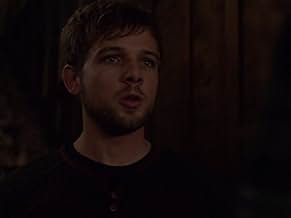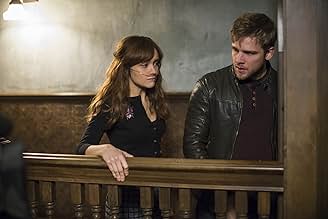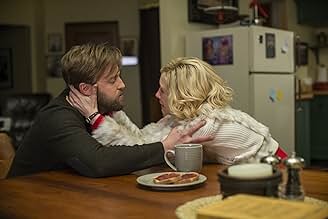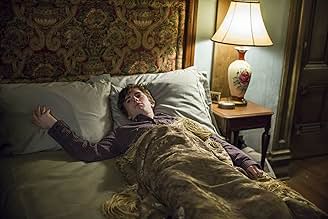Norma Louise
- Episode aired Apr 13, 2015
- TV-MA
- 43m
IMDb RATING
9.0/10
2.3K
YOUR RATING
Norma contemplates a life outside of White Pine Bay; Emma and Dylan bond while helping Norman.Norma contemplates a life outside of White Pine Bay; Emma and Dylan bond while helping Norman.Norma contemplates a life outside of White Pine Bay; Emma and Dylan bond while helping Norman.
- Director
- Writers
- Stars
- Director
- Writers
- All cast & crew
- Production, box office & more at IMDbPro
9.02.2K
1
2
3
4
5
6
7
8
9
10
Featured reviews
Norma's unraveling as she grapples with grief, betrayal, and the suffocating weight of her secrets, while the rest of the family struggles to cope with the fallout
"Norma Louise," the sixth episode of Bates Motel's third season, directed by Christopher Nelson, stands as a powerful and emotionally raw installment that delves deeply into the fracturing psyche of Norma Bates (Vera Farmiga) and the ripple effects of trauma on the entire Bates family. This episode marks a tonal shift, focusing intensely on Norma's unraveling as she grapples with grief, betrayal, and the suffocating weight of her secrets, while the rest of the family struggles to cope with the fallout.
The episode opens in the aftermath of Norma's explosive departure from White Pine Bay. Her frantic drive through the rain, punctuated by her shooting her phone in a moment of desperation and rage, immediately sets a tone of chaos and emotional breakdown. Farmiga's portrayal here is nothing short of mesmerizing-she embodies a woman at the brink, simultaneously vulnerable and volatile. The scene where Norma trades in her battered car for a flashy Mustang evokes a symbolic shedding of her old self, reminiscent of classic cinematic moments of reinvention, such as Janet Leigh's iconic escape in Psycho. This nod to Hitchcockian tradition enriches the episode's thematic resonance.
Norma's journey to Portland, where she attempts to escape her past by adopting a new persona-"Norma Louise Calhoun"-is both heartbreaking and compelling. Her interactions with Taylor, a local man she meets at a bar, reveal her yearning for connection and normalcy, even as her self-destructive tendencies surface. The moment she rebuffs Taylor's advances with a mix of defiance and despair underscores her internal conflict and the complexity of her character. Farmiga's ability to convey these layers-strength, fragility, defiance-anchors the episode emotionally.
Back in White Pine Bay, the episode shifts focus to Norman (Freddie Highmore) and Dylan (Max Thieriot), whose responses to Norma's disappearance reveal their own fractures. Norman's meltdown, culminating in a violent outburst against Dylan, is portrayed with raw intensity. Highmore captures Norman's spiraling mental state with heartbreaking authenticity, while Thieriot's portrayal of Dylan's protective yet exasperated role adds emotional depth. The scene where Dylan physically restrains Norman to prevent further harm is a stark illustration of the family's unraveling.
A poignant highlight is Norman's transformation into "Mother" mode, donning Norma's bathrobe and preparing breakfast in a chilling homage to the iconic character from Hitchcock's Psycho. This moment crystallizes the psychological horror at the series' core and Highmore's performance is both unsettling and tragic, embodying the duality of Norman's fractured identity.
Norma's encounter with James Finnegan, a local professor and therapist, provides a rare glimpse into her vulnerability and desire for help. Their late-night conversation, where Norma confesses the truth about Norman's violent past and her own complicity, is a masterclass in emotional storytelling. Farmiga's nuanced performance conveys the weight of guilt and fear, while the scene's intimate direction and muted lighting create a confessional atmosphere that deepens the narrative's psychological complexity.
Stylistically, Nelson employs a muted color palette and atmospheric lighting that reflect the episode's somber mood and emotional intensity. The cinematography contrasts Norma's chaotic escape with the claustrophobic tension back home, visually reinforcing the theme of entrapment versus freedom. The editing maintains a deliberate pace, allowing the emotional beats to resonate fully without sacrificing narrative momentum. The sound design subtly underscores the episode's tension and melancholy, enhancing the immersive experience.
Thematically, "Norma Louise" explores motifs of identity, escape, and the cyclical nature of trauma. Norma's flight from White Pine Bay symbolizes her desperate attempt to reclaim agency and sanity, even as she is haunted by her past. The episode probes the corrosive effects of secrets and denial on family bonds, illustrating how love and madness intertwine in the Bates household. The title's use of Norma's full name emphasizes her struggle to define herself beyond the roles imposed by family and history.
Critically, the episode was widely praised for its intense performances, particularly from Farmiga and Highmore, and its focus on character psychology over sensationalism. Reviewers highlighted the episode's emotional depth and thematic richness, noting that it elevated the season's narrative by centering on Norma's complex humanity. Some critiques mentioned the episode's slower pacing and heavy focus on Norma's storyline, but these were largely seen as strengths that allowed for profound character exploration.
"Norma Louise" is a standout episode that exemplifies Bates Motel's ability to blend psychological horror with intimate family drama. Through evocative direction, powerful performances, and layered storytelling, it immerses viewers in the tragic unraveling of a woman caught between love, madness, and the desire for redemption.
The episode opens in the aftermath of Norma's explosive departure from White Pine Bay. Her frantic drive through the rain, punctuated by her shooting her phone in a moment of desperation and rage, immediately sets a tone of chaos and emotional breakdown. Farmiga's portrayal here is nothing short of mesmerizing-she embodies a woman at the brink, simultaneously vulnerable and volatile. The scene where Norma trades in her battered car for a flashy Mustang evokes a symbolic shedding of her old self, reminiscent of classic cinematic moments of reinvention, such as Janet Leigh's iconic escape in Psycho. This nod to Hitchcockian tradition enriches the episode's thematic resonance.
Norma's journey to Portland, where she attempts to escape her past by adopting a new persona-"Norma Louise Calhoun"-is both heartbreaking and compelling. Her interactions with Taylor, a local man she meets at a bar, reveal her yearning for connection and normalcy, even as her self-destructive tendencies surface. The moment she rebuffs Taylor's advances with a mix of defiance and despair underscores her internal conflict and the complexity of her character. Farmiga's ability to convey these layers-strength, fragility, defiance-anchors the episode emotionally.
Back in White Pine Bay, the episode shifts focus to Norman (Freddie Highmore) and Dylan (Max Thieriot), whose responses to Norma's disappearance reveal their own fractures. Norman's meltdown, culminating in a violent outburst against Dylan, is portrayed with raw intensity. Highmore captures Norman's spiraling mental state with heartbreaking authenticity, while Thieriot's portrayal of Dylan's protective yet exasperated role adds emotional depth. The scene where Dylan physically restrains Norman to prevent further harm is a stark illustration of the family's unraveling.
A poignant highlight is Norman's transformation into "Mother" mode, donning Norma's bathrobe and preparing breakfast in a chilling homage to the iconic character from Hitchcock's Psycho. This moment crystallizes the psychological horror at the series' core and Highmore's performance is both unsettling and tragic, embodying the duality of Norman's fractured identity.
Norma's encounter with James Finnegan, a local professor and therapist, provides a rare glimpse into her vulnerability and desire for help. Their late-night conversation, where Norma confesses the truth about Norman's violent past and her own complicity, is a masterclass in emotional storytelling. Farmiga's nuanced performance conveys the weight of guilt and fear, while the scene's intimate direction and muted lighting create a confessional atmosphere that deepens the narrative's psychological complexity.
Stylistically, Nelson employs a muted color palette and atmospheric lighting that reflect the episode's somber mood and emotional intensity. The cinematography contrasts Norma's chaotic escape with the claustrophobic tension back home, visually reinforcing the theme of entrapment versus freedom. The editing maintains a deliberate pace, allowing the emotional beats to resonate fully without sacrificing narrative momentum. The sound design subtly underscores the episode's tension and melancholy, enhancing the immersive experience.
Thematically, "Norma Louise" explores motifs of identity, escape, and the cyclical nature of trauma. Norma's flight from White Pine Bay symbolizes her desperate attempt to reclaim agency and sanity, even as she is haunted by her past. The episode probes the corrosive effects of secrets and denial on family bonds, illustrating how love and madness intertwine in the Bates household. The title's use of Norma's full name emphasizes her struggle to define herself beyond the roles imposed by family and history.
Critically, the episode was widely praised for its intense performances, particularly from Farmiga and Highmore, and its focus on character psychology over sensationalism. Reviewers highlighted the episode's emotional depth and thematic richness, noting that it elevated the season's narrative by centering on Norma's complex humanity. Some critiques mentioned the episode's slower pacing and heavy focus on Norma's storyline, but these were largely seen as strengths that allowed for profound character exploration.
"Norma Louise" is a standout episode that exemplifies Bates Motel's ability to blend psychological horror with intimate family drama. Through evocative direction, powerful performances, and layered storytelling, it immerses viewers in the tragic unraveling of a woman caught between love, madness, and the desire for redemption.
Did you know
- TriviaThere's a few scenes in the early part of the episode that loosely recreate the opening scene of the original Psycho (1960) movie where the girl is on the run and trades her car for another one.
- Quotes
Norma Louise Bates: Parents do not have needs. You ever read the book "The Giving Tree"? It's about a tree, and this kid keeps coming and taking stuff from it his whole life, until there's nothing left but a stump. And then the kid sits on the stump. That's being a parent.
Details
Contribute to this page
Suggest an edit or add missing content


























